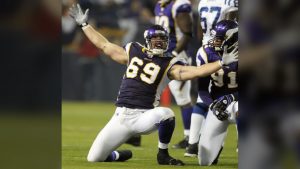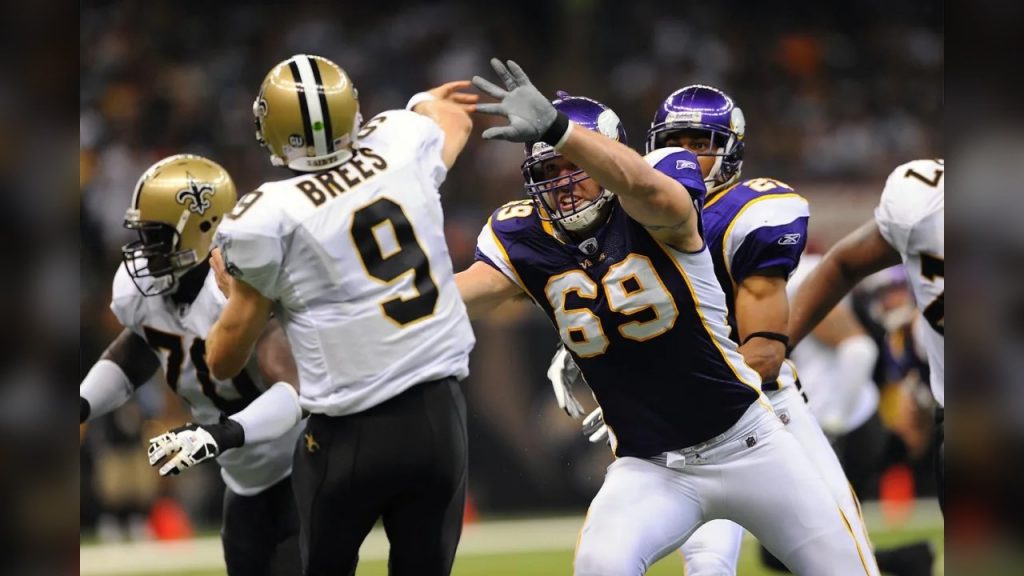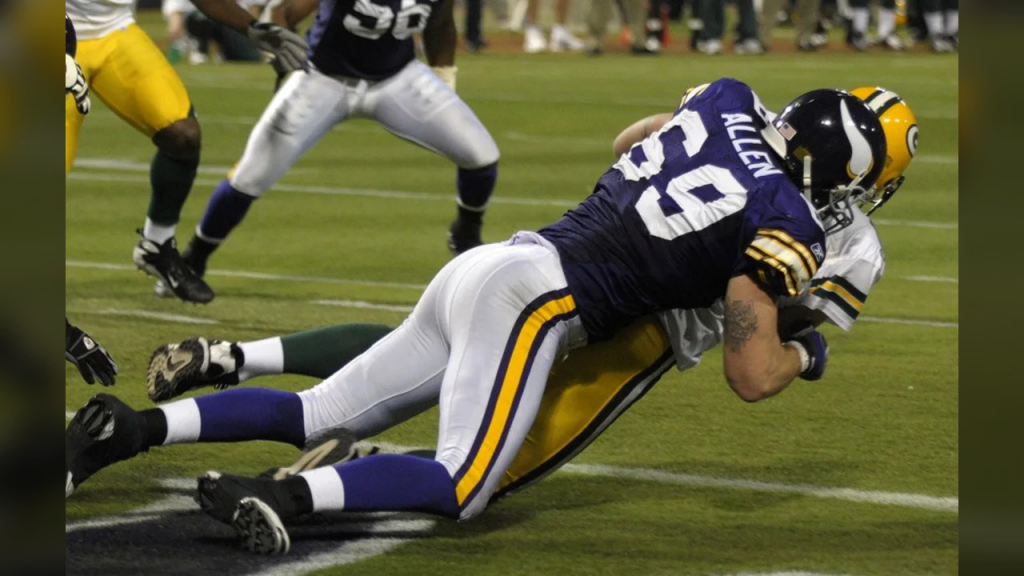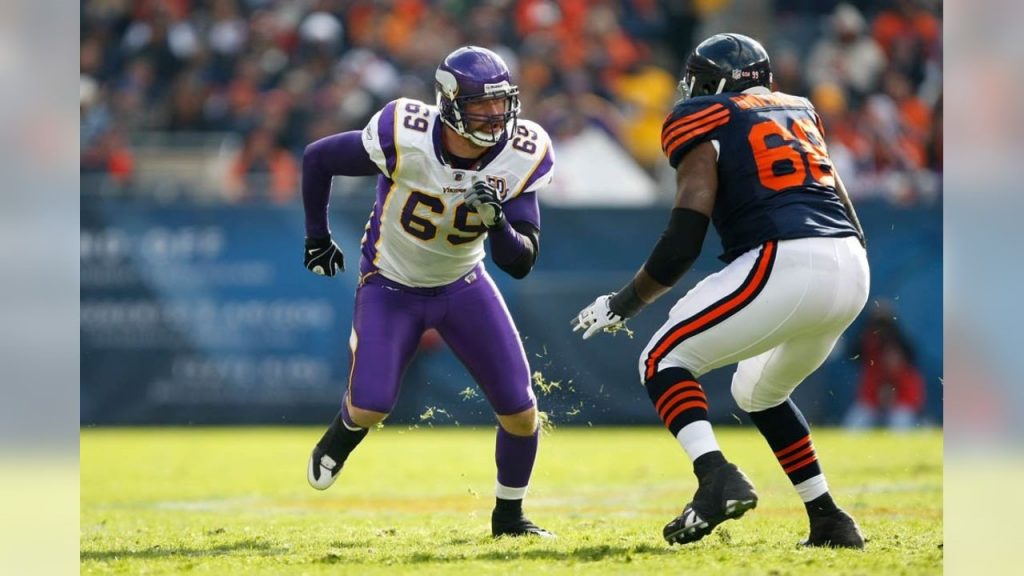The Curious Case of Jared Allen’s Hall of Fame Nomination

As a former resident of the great state of Idaho, I have heard plenty of stories about the Idaho State football teams of the early 2000s. Typically, these stories came from older men drinking a Coors Light on their porch. While there are always plenty of characters, the tales cannot be told without including one man in particular.
This man has strangely formed a bond between those Idahoan porch beers and Minnesota Vikings fans. While he wasn’t ever able to bring either group a championship, he has always been a fan favorite. And most recently, he has been named a nominee of the pro football Hall of Fame this week. This man is of course, the great defensive end Jared Allen.
Whenever someone is nominated as a candidate for any sports’ hall of fame, the first question always becomes “does he/she deserve to get in?”. Well, let’s dive into that question. Here are my thoughts on Jared Allen and his potential Hall of Fame induction. If you have any of your own thoughts to add, feel free to comment below!
Allen’s Journey From DUIs to All-Pro

I bet if you asked someone who has been watching football for the past 10-15 years to think of Jared Allen, they would picture him in a Vikings uniform. While we all associate him with the Vikings, Allen was actually drafted in the fourth round of the 2004 draft by the Kansas City Chiefs.
His career got off to a quiet, yet productive start. He only started ten games in his rookie year with the Chiefs, but he recorded nine sacks. Allen moved into a full time starting role in 2005, and he immediately made a huge impact, recording 11 sacks and forcing six fumbles.
Allen truly broke headlines in 2007 when he recorded a league leading 15.5 sacks. However, his life off the field quickly became just as much of a headline due to two separate DUI charges during 2006. A third would result in a yearlong suspension from the NFL.
The relationship between Allen and the Chiefs franchise came to a head after the 2007 season where the Chiefs went an abysmal 4-12 despite Allen’s All-Pro level of play. Allen no longer wanted anything to do with a rebuilding franchise and requested a trade.
The Minnesota Vikings soon came to a deal with the Chiefs to acquire the star defensive end, offering a first round pick, two third rounders, and a sixth rounder. Minnesota then offered Allen a six-year, $31 million contract. Seems like the equivalent of pulling change out of the car cup holder to pay for that Big Mac meal when you look at what All-Pro players get paid today.
Vikings fans know where the story goes from here. The Vikings won the division each of the next two years and were an overtime away from making the Super Bowl in 2009. In Allen’s six years with the Vikings, the team made three postseason appearances, and Allen never had fewer than 11 sacks. His dominance from the defensive end position came to the peak of its powers in 2011 when he recorded 22 sacks, just half a sack behind Michael Strahan’s single season record of 22.5.
Allen without question contributed to a new winning culture in Minnesota, who had made the postseason just one time in the seven years prior to Allen’s arrival to the the team. 2008 and 2009 were also the first back-to-back division titles for Minnesota since the era of the Purple People Eaters in the ‘60s and ‘70s.
The Vikings have made the postseason six of the 12 years since Allen’s arrival. Obviously, Allen isn’t solely responsible for everything that has happened, but he clearly played a huge part in Minnesota’s return towards relevance.
Prior to the 2014 season, Allen signed a 4-year, $32 million deal with the Bears that Vikings fans held against him at the time, but secretly,they were probably happy to see him go before his career declined. For a real trip back in time, take a look at this gem from Vikings Territory covering the signing.
Allen started 15 games in 2014, but he recorded just 5.5 sacks for the Bears. Two games into the 2015 season, Chicago traded him to Carolina where he made his first and only Super Bowl with the Panthers, but lost to the Denver Broncos. On April 14, 2016, Allen signed a one day deal with the Vikings and officially announced his retirement from football, and ever since, his Hall of Fame status has been up for debate.
The Hall of Fame Debate

So what does football take into account when deciding if someone should be a Hall of Famer, especially for a defensive end like Allen? The Pro Football Halll of Fame currently is the most exclusive hall of fame, containing 326 members compared to baseball’s 333 and basketball’s 401, and hockey’s 417. Of these 326 members, 19 are defensive ends, according to profootballhof.com.
So, how did these guys get into the hall? Well, a lot of them were considered winners. 12 of the 19 won Super Bowls/NFL championships during their careers. Four others played in Super Bowls/championships and lost.
These four are worth giving Allen a comparison to because remember, he started that Super Bowl with Carolina in his final year. They are Carl Eller (another Vikings legend), Claude Humphrey, Lee Roy Selmon, and Bruce Smith.
Unfortunately, this is where I made a boneheaded mistake. I foolishly thought that the comparison would be as simple as typing a search into pro-football-reference.com, but I forgot one key thing. You see, Humphrey played from 1968-81, Eller from 1964-79, and Selmon from 1976-1984. Sacks weren’t an official stat until 1982, and tackles weren’t consistently recorded until the 1990s. It is nearly impossible to truly compare these guys to Allen without a time machine. And as for Smith, his case is clear. He is the all-time leader in career sacks with 200.
It turns out you can’t just calculate the process of induction into the Hall of Fame.
So, after wasting the majority of the day on meaningless research, I am left to speculate with the rest of you. History says that Allen’s case is not a good one having never won a Super Bowl. But can we really say that the team’s lost because of him and not the other 52 guys on the roster?
For example, here’s the list of every quarterback that started for Jared Allen’s teams: Trent Green, Damon Huard, Brody Croyle, Gus Frerotte, Tarvaris Jackson, Brett Favre, Brett Favre’s corpse, Joe Webb, Christian Ponder, Donovan McNabb (at age 35), Matt Cassel, Jay Cutler, Jimmy Clausen, and Cam Newton.
Other than Favre, the six games of pegleg McNabb, and Newton, not a ton of recognizable guys unless you’re a Chiefs or Vikings fan that suffered through their stints. If you did recognize any of them, you probably, like me, thought to yourself “oh wow, I forgot how bad he was”. I mean, the two years he had a decent quarterback, he made the NFC championship game in 2009, and his team went to the Super Bowl in 2015.
If we look at Allen’s individual statistics as well, there is nothing that says he wasn’t a great player. He is 12th all time in sacks, third in tackles for loss, 22nd in forced fumbles, and tied for the most safeties.
Not to mention, the man is second all-time for sacks in a single season by .5 sacks, the slimmest of margins.
Pro-Football-Reference does give us one way that we can approximately compare Allen to the four other non-champion Hall of Famers as well. They have a stat called Approximate Value, which basically estimates how valuable a player was to their team towards winning.
Allen ranks smack dab in the middle at third out of these five players. He is also 20th all-time among defensive ends in this category, ahead of current players like Calais Campbell, J.J. Watt, and Ndamukong Suh.
Finally, we have to ask ourselves if we think that current dominant pass rushers like J.J. Watt, Justin Houston, and Aaron Donald belong in the Hall of Fame. I believe they do. Because of this, I also think Jared Allen has to get in. While their careers aren’t over yet, none of these current guys have won Super Bowls, and Allen was just as dominant in his prime if not more so than these guys are now. He has more career tackles, sacks, tackles for loss, forced fumbles, and fumble recoveries than any of them.
It Won’t Happen This Year

Unfortunately, only a maximum of five modern era players can be chosen to have their names etched in history per year. It just so happens that Allen decided to retire at the same time as players like Peyton Manning, Charles Woodson, Calvin Johnson, and other Super Bowl champions like Wes Welker and Heath Miller.
And those are just the guys that are eligible for the first year. Other iconic champions like receivers Torry Holt and Reggie Wayne have not been inducted, either. This is absolutely a year where a deserved first ballot Hall of Famer is going to get snubbed, and I would be willing to bet the voters value Super Bowls.
It won’t be this year, but Jared Allen’s moment in Canton, Ohio, will come.
